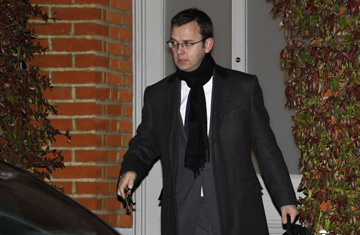
Former News of the World newspaper editor Andy Coulson, leaves his home in London January 27, 2011
(2 of 2)
Other newspapers may well find themselves caught up in the new investigation, but it is the role of the police that may yet prove the most controversial. Specifically, the suspicion that individual officers were routinely paid for information by newspaper reporters.
Labour MP Tom Watson, a member of parliament's culture committee, which launched its own inquiry into the scandal in 2009, says he finds it unfathomable that Scotland Yard did not take its original inquiry further when it had what he calls "a pile of evidence" that other journalists were involved in hacking, much gleaned from private investigator Mulcaire's files which included lists of hundreds of celebrity and political "targets." Even former prime minister Gordon Brown said earlier this week that he has asked police to investigate whether his mobile phone was hacked.
"There is plenty of speculation over why the police appear to have not gone further," Watson told TIME. "There is obviously a close working relationship between [Murdoch's] News International stable of newspapers and the Metropolitan police."
The Met has always insisted it had insufficient evidence to proceed further. Still, a member of the police committee which oversees the role of the Met, Jenny Jones, told the BBC on Wednesday: "I think the Met's motives are now so contaminated by suspicion and doubt that they are going to find it difficult to be trusted on this."
In one unrelated inquiry by the culture committee in 2003, the then-editor of the Sun tabloid, Rebekah Brooks — who is now chief executive of News International — appeared to add fuel to the fire when she told MPs: "We have paid the police for information in the past." After the session, Alison Clark, the director of corporate affairs at News International, called reporters to say: "It is not company practice to pay police for information."
And it is not an issue that many in the British media want to discuss. Confidentially, national newspaper reporters will suggest they have on occasion paid police contacts for information. What will now be worrying those reporters and Scotland Yard is that these dark arts of journalism will be subjected to the full glare of daylight.
